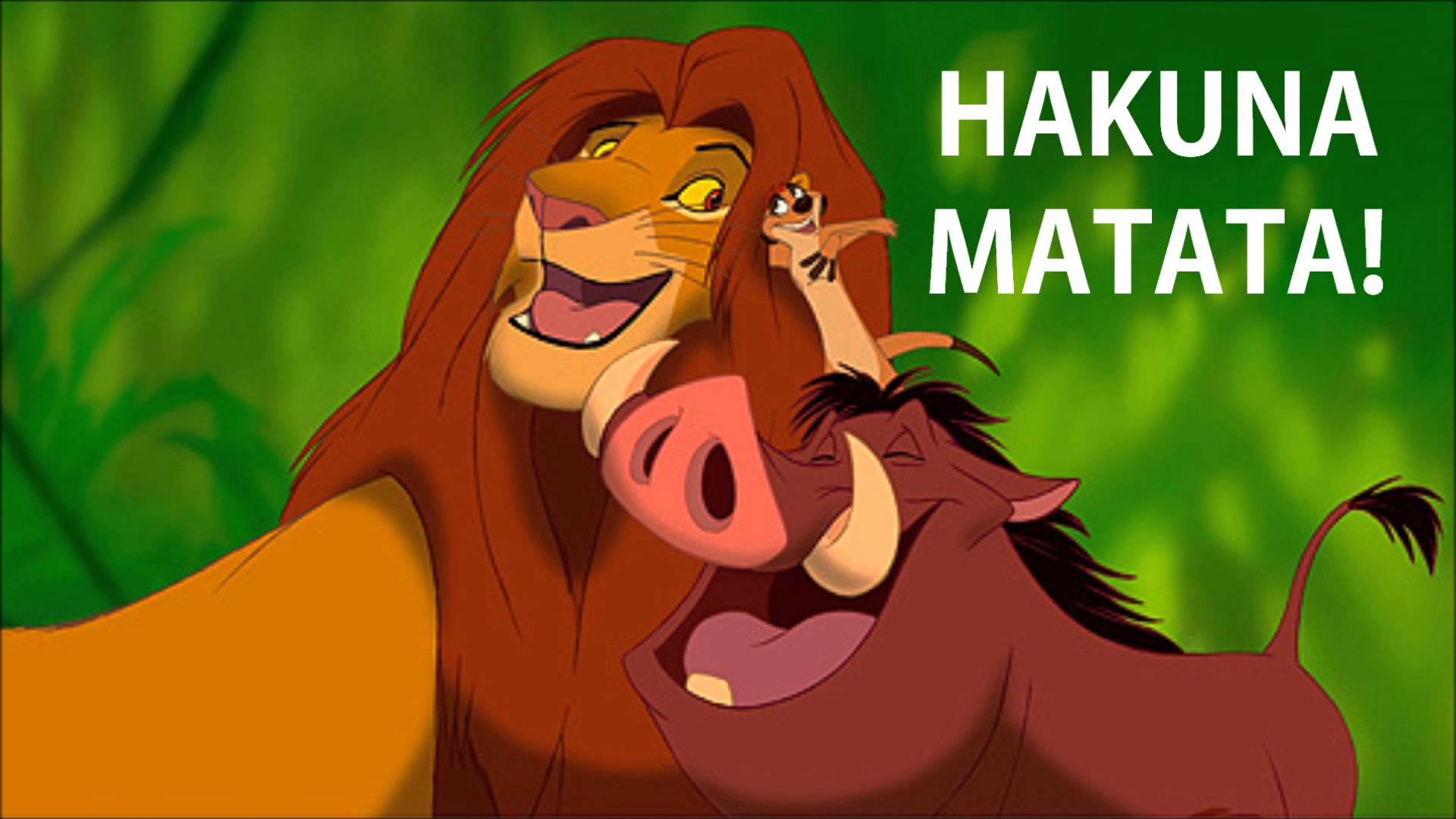
8 Situations In Life When 'Hakuna Matata' Can Be Used To Solve The Problem (in some way atleast
It means "no worries". OK, OK, *puts on serious linguistic hat*. 'Hakuna matata' is actually a phrase in the East African language of Swahili that literally means "no trouble" or "no problems". The music for the song was composed by Elton John with words penned by lyricist Tim Rice, who found the now-famous term in a Swahili.

Hakuna Matata Definition Print Home Decor Nursery Decor Etsy
Official lyric video for "Hakuna Matata" from THE LION KING. Sung by Max Casella, Tom Alan Robbins, Scott Irby- Ranniar and Jason Raize off the Original Broa.
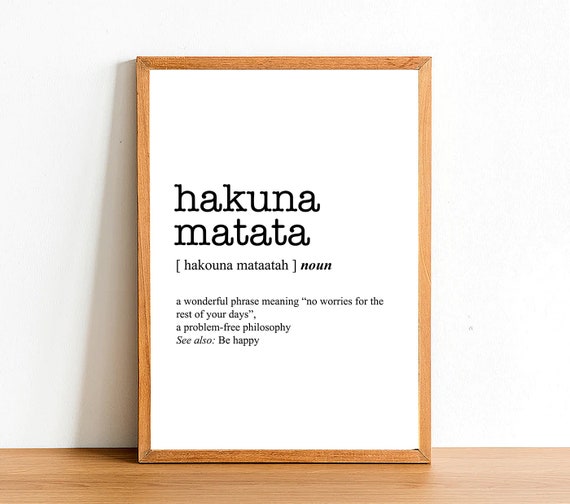
HAKUNA MATATA Word Definition Poster Print Urban Dictionary Etsy UK
The phrase 'Hakuna Matata' is adopted from the language of Swahili from Central East Africa. "Hakuna" in Swahili roughly translates to "there is not here" and "Matata" translates to "problems." Combine together and you get an adjusted meaning of "there are no problems here." Within the song itself, Timon explains what.

Hakuna Matata Definition Meaning Print Poster Disney Lion King Quote Wall Art eBay
Hakuna matata op een boot in Zanzibar. Hakuna matata is een term uit het Swahili die zoiets betekent als "geen zorgen" dan wel "wind je niet op". Letterlijk vertaald luidt de uitdrukking: "er is/zijn geen" ( hakuna) "problemen/moeilijkheden" ( matata ). Voor sprekers van Swahili in het noorden en in het zuiden van Tanzania is de term ongewoon.

Hakuna Matata Definition Meaning Print Poster Disney Lion King Quote Wall Art eBay
"Hakuna Matata" (meaning "no worries" in Swahili) is the theme song and personal anthem of Timon (Nathan Lane), Pumbaa (Ernie Sabella), and Simba (Jason Weaver) from Disney's 32nd animated feature The Lion King. It was composed by Elton John, who also composed other songs from the film, and with the lyrics by Tim Rice. It is Timon and Pumbaa's signature song. In the movie, the song was sung.
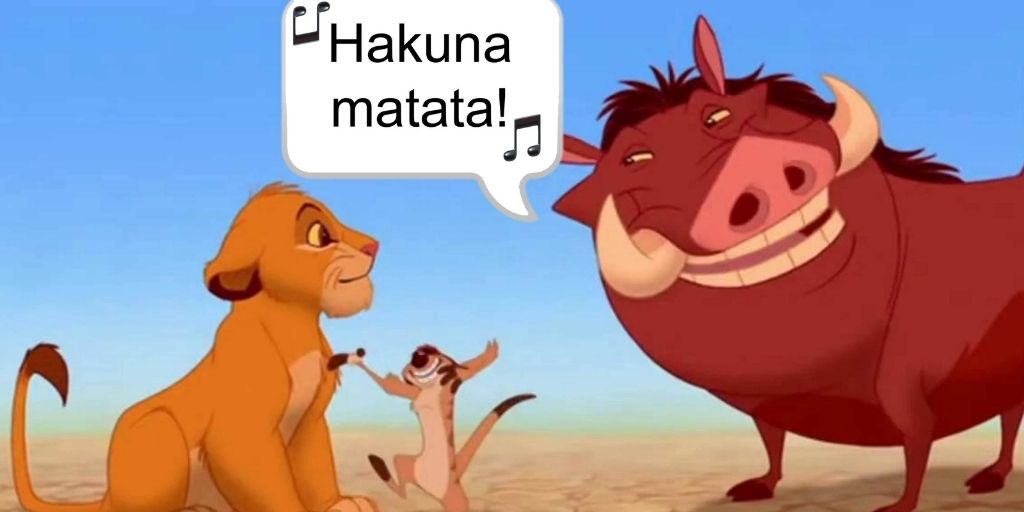
Hakuna Matata Meaning All About This Swahili Phrase ️
Hakuna Matata is a Swahili phrase that became popular with the 1994 Disney film, The Lion King, and means " no trouble " or " no worries .". The phrase encourages a worry-free approach to life and focuses on enjoying life without dwelling on uncontrollable problems. Hakuna Matata is connected to the philosophy of Ubuntu, which.

Hakuna Matata Definition Meaning Metallic Foil Wall Art Print. Disney Inspirational Motivational
" is a song from 's 1994 animated feature film The Lion King [1] The music was written by Elton John. The song is based on Timon and Pumbaa 's catchphrase in the movie, phrase meaning "No worry (ies)". It is characterized by its simple 4/4 , upbeat message and catchy lyrics. The song's music and melody were composed by Elton John, with lyrics by .

HAKUNA MATATA Paco Magazine Palencia Cultura y Ocio
According to NPR, the phrase hakuna matata means "no worries" in Swahili, which is a language spoken in countries like the Democratic Republic of the Congo, Kenya, Tanzania and Uganda. Roughly 60 to 150 million people speak Swahili. This phrase was popularized in the 1994 Disney film The Lion King and is a Disney trademark.
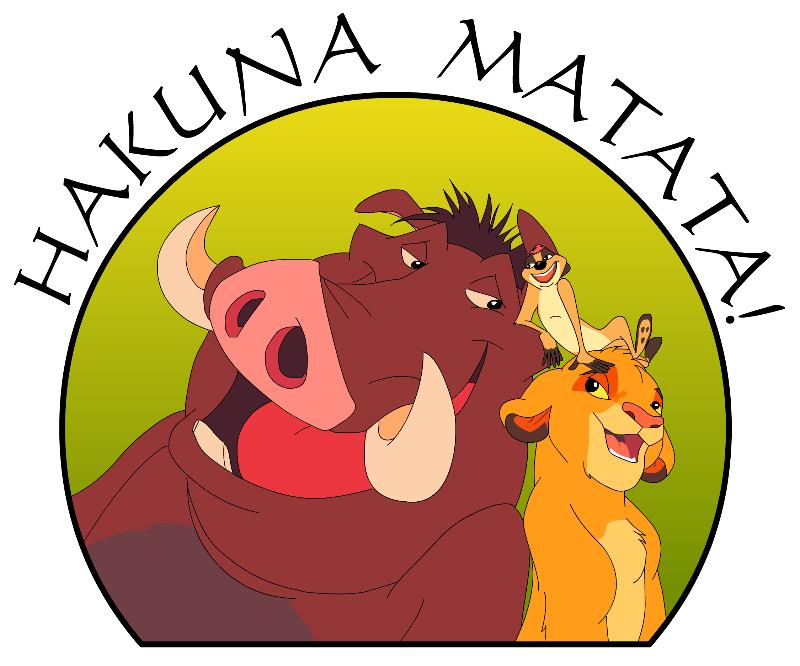
What does 'Hakuna Matata' mean? Trivia Answers
What does hakuna matata mean? Hakuna matata roughly translates to "there are no troubles" in Swahili. The phrase was popularized in English by the 1994 Disney movie The Lion King, where it's translated as "no worries." It has a connotation of not worrying about things outside a person's control. Recommended videos Powered by AnyClip

Saiba de uma vez qual é a origem de 'Hakuna Matata'
" Jambo Bwana " (in Swahili " Hello Sir") is a Kenyan pop song also popular in Tanzania. It was first released in 1982 by Kenyan band Them Mushrooms, and later covered by a number of other groups and artists, including Mombasa Roots, Safari Sound Band, Khadja Nin, Adam Solomon, Mani Kollengode, [1] [2] and the German group Boney M.
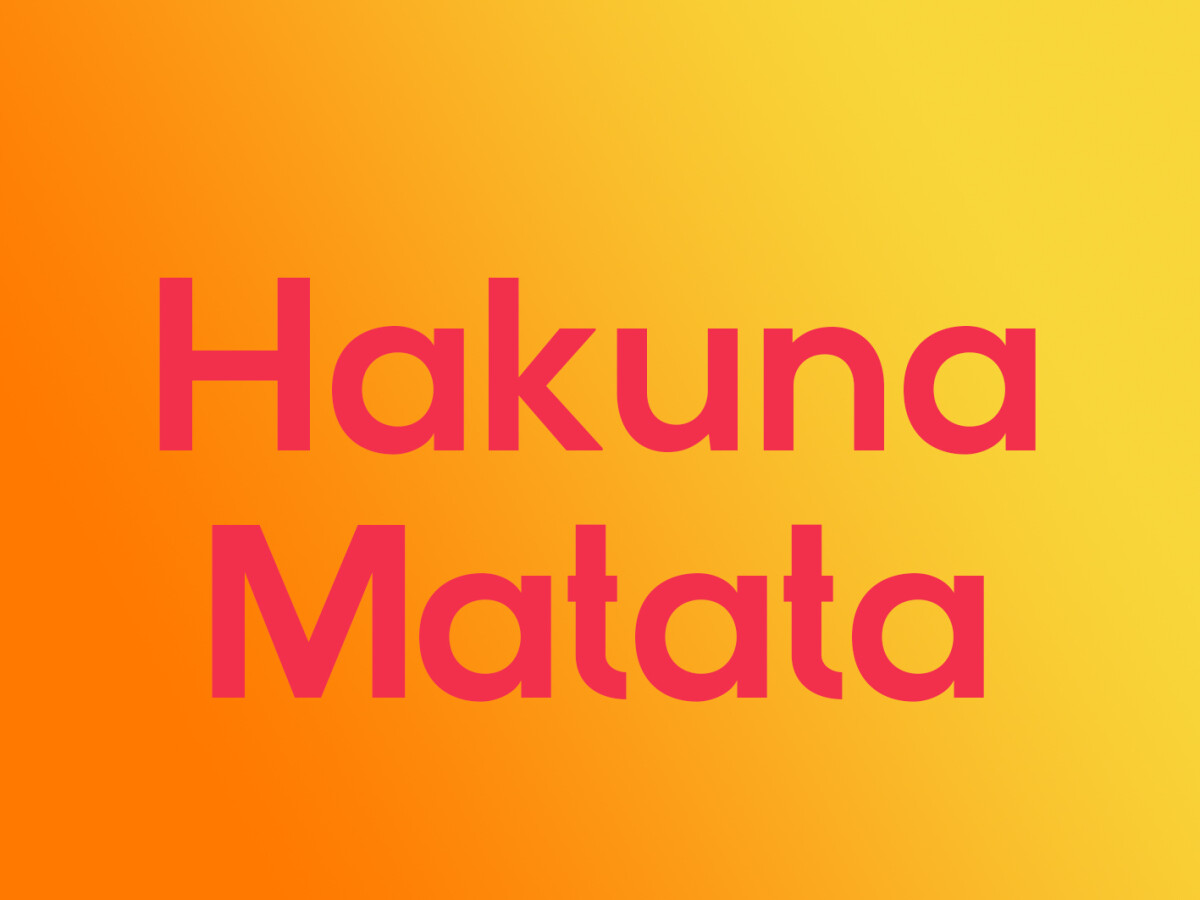
Was heißt Hakuna Matata? Bedeutung und Definition des Ausdrucks NETZWELT
Hakuna Matata meaning broken down. Two Swahili words form the phrase: Hakuna 'there are no/there is no'; Matata, the plural of the word 'problem'; The meaning of Hakuna Matata is reminiscent of the feel-good tune, "Don't Worry Be Happy," popularized in the 1980s by singer-songwriter Bobbie Ferrin. Since The Lion King's release, it's common to hear English speaking visitors to.

Buntes Wandtattoo Hakuna Matata von K&L Wall Art wallart.de
What does 'Hakuna matata' from 'The Lion King' mean? - Classical Music. We explain the meaning of 'hakuna matata', the iconic song from Disney's 'The Lion King'. With music by Elton John, it's catchy - but what does it mean?

Hakuna matata meaning Hakuna matata, Hakuna matata symbol, Hakuna
Embark on a journey to rediscover the essence of "Hakuna Matata" in the adult world. Explore the author's insights on maintaining a worry-free mindset, selecting positive influences, and embracing a 'Hakuna Matata' approach to life's challenges. Discover the transformative power of travel and the importance of being present in a world filled with daily stresses.

Hakuna Matata Definition Meaning Wall Art Print. Disney Inspirational Motivational Lion King
" Hakuna matata " is a Swahili phrase, meaning "no trouble" or "no worries" and "take it easy" (literally hakuna: "there is no/there are no"; matata: "worries".) The 1994 Walt Disney Animation Studios animated film The Lion King brought the phrase to Western prominence in one of its most popular songs, in which it is translated as "no worries".
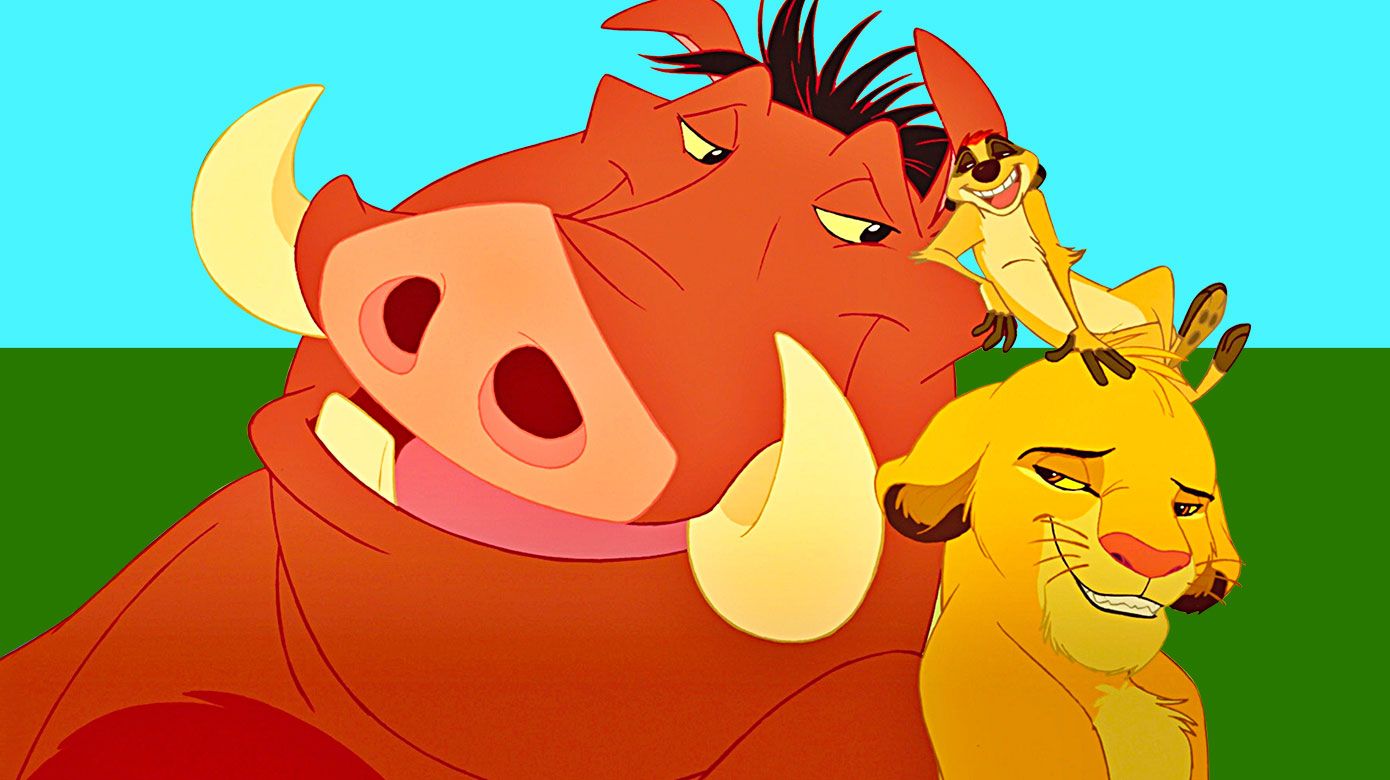
Entenda de uma vez por todas o significado de Hakuna Matata!
Hakuna matata definition: no worries or no troubles: a Swahili phrase used to suggest that a person should enjoy life and not worry about things they cannot control. See examples of HAKUNA MATATA used in a sentence.

Hakunamatata What the Meaning Of HAKUNAMATATA???
Origine de l'expression « Hakuna Matata ». Directement issu de la langue swahilie, « Hakuna Matata » est constitué des termes « Hakuna », qui signifie « il n'y a pas », et « Matata », qui veut dire en français « problème », « chaos » ou encore « difficulté » : la traduction littérale s'impose donc d'elle-même.